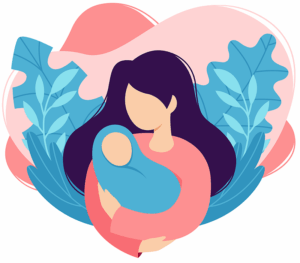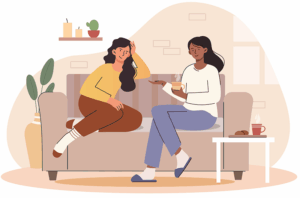 Having a baby is a joyous and exciting time, but for some women, it can seem simply joy-less and overwhelming. After nine months of carrying new life into the world, meeting your new little one should be one of the greatest moments of your life. But what if it isn’t? What if it’s nothing like you see in the movies, nothing like your friends have experienced, nothing like you imagined it would be?
Having a baby is a joyous and exciting time, but for some women, it can seem simply joy-less and overwhelming. After nine months of carrying new life into the world, meeting your new little one should be one of the greatest moments of your life. But what if it isn’t? What if it’s nothing like you see in the movies, nothing like your friends have experienced, nothing like you imagined it would be?
Postpartum depression is real and affects 1 in 8 women after having a baby. And, the baby blues, a milder form of postpartum depression, is real too. Postpartum depression and the baby blues—which are not one in the same—are often spoken of casually, but both are a form of mental illness. Making it even worse, these mental illnesses target women whose bodies and minds have been put through ups and downs, stress and physical strain over the course of many months.
Postpartum depression can set in 1 to 3 weeks after giving birth and requires treatment from a health care provider to get better. It’s marked by sadness, anxiety and exhaustion that impede a mother’s ability to care for herself or her baby. Postpartum depression is diagnosed by having five or more of the following symptoms that last for two weeks or more:
Changes in your feelings:
- Feeling depressed most of the day every day
- Feeling shame, guilt or like a failure
- Feeling panicked or scared a lot of the time
- Having severe mood swings
Changes in your everyday life:
- Having little interest in things you normally like to do
- Feeling tired all the time
- Eating a lot more or a lot less than is normal for you
- Gaining or losing weight
- Having trouble sleeping or sleeping too much
- Having trouble concentrating or making decisions
Changes in how you think about yourself or your baby:
- Having trouble bonding with your baby
- Thinking about hurting yourself or your baby
- Thinking about suicide (killing yourself)
The baby blues can also trigger feelings of sadness after giving birth but usually last two weeks or less. The baby blues typically presents 2 to 35 days after giving birth and is accompanied with sleeplessness, moodiness, and frequent crying but its shorter duration and milder symptoms set it apart from postpartum depression. Nonetheless, moms experiencing the baby blues are indeed struggling with feelings out of their control and should let their health care provider know what they are experiencing.
While there is no definitive cause, it’s believed that postpartum depression could be triggered by changing hormone levels postpartum; your genetic composition passed on to you by your parents, such as a family history of depression; or even low levels of thyroid hormones. Other risk factors include:
- Depression during pregnancy
- Physical or sexual abuse
- Significant life stress
- Diabetes
- Complications during pregnancy
- Smoking, drinking or drug use
- Trouble breastfeeding or caring for your baby
Postpartum depression should be treated like other health challenges, with the support of health care providers that should include your prenatal care provider, your primary care provider, a mental health provider and your baby’s health care provider.
 Hey moms, want to make sure your family is happy and healthy? Start by making sure YOU are happy and healthy. A healthy—mentally and physically—mom can give her best to those she loves. In addition to eating healthy and staying active, don’t underestimate the importance of:
Hey moms, want to make sure your family is happy and healthy? Start by making sure YOU are happy and healthy. A healthy—mentally and physically—mom can give her best to those she loves. In addition to eating healthy and staying active, don’t underestimate the importance of:
- Keeping in touch with the people you care about
and who care about you - Taking time for yourself and taking time to be with your partner
- Letting others help and not being afraid to ask
- Doing the things you liked to do before you had kids
Professional help is just a call or a click away.
BHS—800-765-3277, 24 hours a day, seven days a week
National Suicide Prevention Lifeline—988, 800-273-TALK (8255), 988lifeline.org
National Alliance on Mental Illness—800-950-NAMI (6264), www.nami.org
 BHS, our EWTF mental health services provider, can also be an important partner in diagnosing and treating postpartum depression and the baby blues. BHS is a covered benefit for all EWTF members and their family members. And, don’t forget that the challenges posed by postpartum depression and the baby blues don’t just affect moms; dads, partners and other family members can feel stress as well, especially when someone they love is struggling.
BHS, our EWTF mental health services provider, can also be an important partner in diagnosing and treating postpartum depression and the baby blues. BHS is a covered benefit for all EWTF members and their family members. And, don’t forget that the challenges posed by postpartum depression and the baby blues don’t just affect moms; dads, partners and other family members can feel stress as well, especially when someone they love is struggling.

